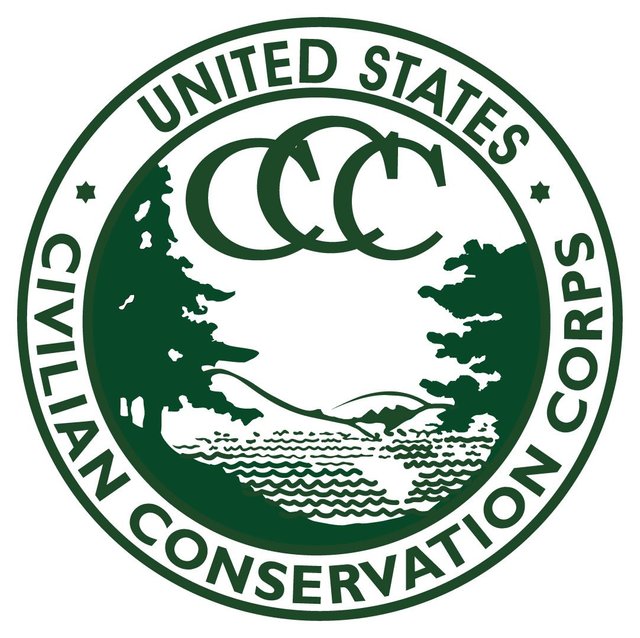Tackling an economic recession and ecological crisis at the same time? We've done it before. Make the history of (ecological) work relief relevant again.


America, 1933. The Great Depression is in full swing. Schools are closing, the middle class is struggling with drastic income loss and high unemployment. Poverty and hunger are spreading across the country like a virus. Nothing and no one is spared. Like a devastating hurricane, the economic depression paralyzes the country under a blanket of despair.
As if the government did not get enough on its hands already, the country was also plagued by environmental disasters in the 1930s. Devastating floods of the Ohio and Mississippi River and the severe drought and dust storms on the American prairies (caused in part by decades of intensive agriculture) were creating immense challenges for the country.
To cope with both the harrowing unemployment among young Americans in particular and the environmental disasters that plague the country, the Civilian Conservation Corps (CCC) was being created: a work relief program that employed millions of young men. The program provided manual labor jobs related to the conservation and development of natural resources in rural lands.
.jpg)
CCC boys leaving camp for home; Lassen National Forest, California. Source: OSU Special Collections & Archives

CCC workers constructing a road in what is now Cuyahoga Valley National Park, 1933. Source: U.S. National Archives and Records Administration - unknown author
It has been somewhat forgotten, but it turned out to be one of the most successful programs of Franklin D. Roosevelts' New Deal, and the beginning of the emergence of modern environmentalism. The CCC created public landscapes, planted 3.5 billion trees, established over 700 new state parks, upgraded or built over 90,000 acres of campgrounds, helped complete the Appalachian and Pacific Coast hiking trails, built 40,000 bridges, 4,500 rustic cabins and hiking shelters and created shelterbelts of trees to mitigate the impact of the devastating Dust Bowl.
Make the history of (ecological) work relief relevant again
We are currently living in historical times again, and the likelihood of a deep recession is increasing day by day. Some analysts have gone so far as to make a comparison with the Great Depression of the 1930s. Whether this is justified remains to be seen, but it does indicate the atmosphere of the moment. And it is precisely the combination of acutely emerging and impending unemployment and the ever-advancing ecological problems, such as climate change and loss of biodiversity, that makes the history of (ecological) work relief relevant again.
In May last year, Governor of the US state of Washington, Jay Inslee - earlier in the race for the Democratic primaries - already advocated for a CCC-inspired Climate Conservation Corps. His idea: give young Americans the opportunity to serve their country and the world to secure a healthy and sustainable future. That is, teach young Americans in a modern and efficient way to renovate homes and buildings or install solar panels on roofs. To build healthier communities free from pollution and with clean water, food security and green development. As part of this public service, the governor also would invest in training programs, sustainable network organizations and new jobs for the green economy.
No one feels the urgency of this mounting climate crisis more acutely than young people. Today they are mobilizing to demand that elected leaders give them a fighting chance at a healthy future. This movement is spurred on by the obvious peril of climate change, but it is also inspired by a vision of hope. And the concept of a Climate Corps is one that appeals to Americans of all ages – receiving over 60% support, including majorities of both Democrats and Independents, according to polling done by the think tank Data for Progress. - Jay Inslee
We need to start thinking big
Until recently, ideas like this were unimaginable for many people in Western countries. The belief in market forces and deregulation has long held this kind of government-driven strategies in an archaic light. However, this seems to be changing in recent years. The Green New Deal put forward by climate activists was first presented by the Democrats last year, and has already been further elaborated in the European Green Deal. The corona crisis has the potential to accelerate all of this.

So let us use this momentum to make a transition to a more sustainable economy. In addition to tax and labor market reform, we should advocate a revaluation of value-based policies and collective services.
The 'ecological service' - for lack of a better name - might mean something like a new 'collective service'. Not mandatory, but voluntary. It would give (young) people and (future) unemployed people the opportunity, in exchange for decent compensation, to make efforts to make society more sustainable. Business can play an important role in this.
Although, I do admit, I don't have the wisdom in lease, I do know that we need to start thinking big to tackle both economic and ecological problems at the same time. Exceptional times call for exceptional measures. We need something that can inspire us collectively. Perhaps our own past can be of service. Not to replicate projects from the past, but to revive them, with a contemporary touch. We've done it before!
